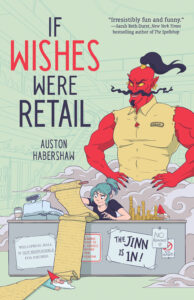
With some travel on the docket and Cozy SFF on the Bingo board, I was looking for a lighter fantasy to serve as airplane reading. Having enjoyed Auston Habershaw’s short fiction in the past, If Wishes Were Retail caught my eye and seemed to fit the bill perfectly. And as it turned out, the book was exactly what I was looking for.
If Wishes Were Retail stars a bookish teenager looking to escape her hometown for the dream of college at NYU. But her father’s propensity for being taken in by scams leaves her parents’ marriage on the rocks and their financial situation unstable. And so she takes a job at the mall in an attempt to start scraping together her own funds. But her boss, a jinn who has spent much of the past centuries imprisoned, doesn’t exactly have his finger on the pulse of how to run a kiosk in suburbia. Absurdity ensues.
If that setup sounds to you like the opening of a farce, you aren’t wrong. But If Wishes Were Retail isn’t just out to amuse readers by leaning into some fish-out-of-water absurdity. Rather, it’s a book that has a lot to say about the foibles and sins of contemporary society, and it’s fully committed to making serious points, even if they’re dressed up in comic garb. Comparisons to Terry Pratchett are overdone, and I do not mean to imply that the voice here is especially Pratchett-like, but the attempt to tackle serious issues while poking fun at the absurdity of fantasy life is very much in the same vein. It’s a tricky balance to maintain, and Habershaw does so effectively.
While not a perspective character, the book’s star is the jinn whose garishly red, mustachioed visage graces the cover. He has a deeply ingrained sense of fairness and absolutely no concept of legal or social expectations, with generally hilarious results. It’s pretty clear from the get-go that he would go way, way too hard for a suburban shopping mall, but it’s more of a welcome surprise just how earnest his character would be. It takes a while for the reader to understand why a being of such immense power would open up a mall kiosk in the first place, and the answer to that question is part of a character portrait with a lot more depth than expected.
The theme of earnest comic relief continues with the lead’s hapless father and brother. Over-the-top sitcom-style buffoonery is rarely my style, and a gullible MAGA father and brother who seems ready to follow in his footsteps make for some of my least favorite elements in the story. But like the jinn, they’re here to be more than just the butt of a few jokes. Instead, their characters grow from cartoonish idiocy into something remarkably human, demonstrating real care for family and neighbors, even if they often don’t show that care effectively. It’s a tricky balance to get right, as it’s easy for such characterization to read as offputtingly condescending—this is what bothered me about Fredrik Backman’s Anxious People, which makes a similar turn from comic relief to caring—and my personal tastes predispose me to read it in that way. But it helps here that these are side characters instead of the ones who are front-and-center of every chapter, and the character growth dovetails nicely with the book’s major themes.
The biggest of those themes focus on the exploitation of underpaid labor and on humanity’s consistent inability to know what’s best for them. The latter is well-trod ground in genie stories, and it’s easy to see how it would be played for laughs in the book’s early stages. But as the narrative pulls back layers on the jinn’s history and reasons for setting up a wish shop, the theme turns from pure comic relief into something a bit deeper and more thoughtful. There’s certainly the expected dollop of anti-materialism and anti-capitalism, along with a fair bit of nostalgia for bygone days, but it investigates more aspects of the theme than I’d expect from a short comic fantasy.
The labor theme may seem less suited to comic fantasy, but it’s handled here with aplomb and makes for perhaps my favorite subplot in the book. I’ll not spoil too much, though a genre-savvy reader will surely see the seeds of the subplot fairly early, but it manages to be genuinely funny while wading into stereotypes and misinformation about immigrant groups and the way society simultaneously depends on and disvalues them.
Overall, If Wishes Were Retail gave me just what I wanted in an airplane read, along with a little bit more than I expected. It’s short and easy to binge—I read well over 200 pages on a 2.5-hour flight—with plenty of laughs and some thematic depth besides.
Recommended if you like: comic fantasy that also has themes.
Can I use it for Bingo? I’d call it hard mode for Down With the System, and while I don’t think it’s Cozy The Marketing Category, I think it probably serves as Cozy the Bingo Category. It also fits Stranger in a Strange Land, Hidden Gem, Indie Publisher, Published in 2025, and has Epistolary segments.
Overall rating: 16 of Tar Vol’s 20. Four stars on Goodreads.
